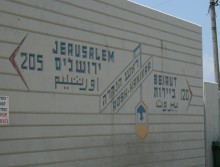
Sign showing the distance between Jerusalem and Lebanon’s capital city. Illustrative. By Joshua Spurlock
Syria’s role in promoting Middle East terrorism and the threat it could further embolden Hezbollah terrorists in Lebanon was emphasized on Thursday—by Hezbollah’s own leader. Proudly emphasizing the military aid the Syrian regime has given terrorists fighting Israel, the terror leader said they were open to getting even more powerful weapons.
“We are ready to receive any game-changing weapons, and we are ready to possess and protect them, and use them,” Hezbollah Secretary General Sayyed Hasan Nasrallah was quoted as saying by the Lebanese television station Al Manar. Nasrallah highlighted Syria’s long-standing role as transferring Iranian weapons to terrorists in Lebanon.
The New York Times reported that Israel last weekend targeted weapons in Syria believed to be advanced missiles bound for Lebanese terrorists. Hezbollah started a war with Israel in 2006 and has continued to build its weapons stockpile since then. The Lebanese terror group is also believed to have attempted terror attacks on Israeli targets around the world, including a bus bombing in Europe last year.
More sophisticated “game-changing” weapons could empower Hezbollah to be even more willing to launch attacks and would increase the chances of more Middle East warfare. Regional conflict is a threat to the security of Israel—the top US ally in the region—and can lead to higher oil prices.
Nasrallah declared they will “we will stand by the Syrian popular resistance” that wants to take the Golan Heights from Israel. He also called for Arabs to formally recognize the threat of a Jewish Israel—effectively denying the historical right of Jews to have their own country in the region.
The speech underscores the dangers the Syrian regime poses to the Middle East and its involvement in promoting regional conflict.
(By Joshua Spurlock, www.themideastupdate.com, May 10, 2013)
